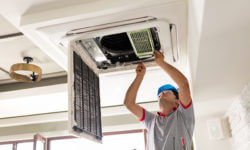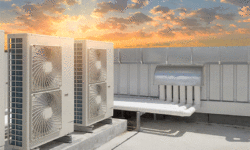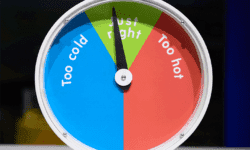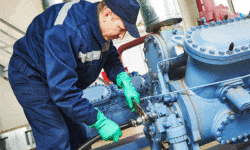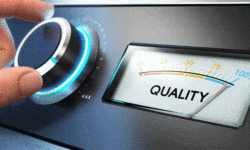Cooling capacity is measured in BTUs (British Thermal Units) just like it is for grills and ovens. The number of BTUs lets you know how much heat the unit can manage. It takes a lot of planning and calculation to figure out the correct size for buildings, especially large multi-stories. So, let’s dive into some things you need to know about properly sizing a commercial air conditioner.
Read more →Room temperature is always a hot topic in the office. No matter what you set the workplace thermostat to, it can seem impossible to please everyone. Someone is always too hot or too cold. Even so, it’s very important to get it right, because research shows that temperature has serious effects on work performance. Turns out, it’s far more than just a comfort issue. So, what is the optimal workplace temperature? Let’s dive into the science to find out.
Read more →If you’re in the market for a new commercial HVAC unit, you’ve likely come across dozens of HVAC acronyms. Just like any other line of work, the HVAC industry uses hundreds of acronyms. And, sometimes this can make shopping for a new unit confusing. But, have no fear – we’re here to help by decoding 10 common HVAC acronyms.
Read more →No one likes to be misinformed, especially when it comes to heating and cooling your building. And, before you can properly maintain your company’s HVAC system, you have to know what not to do. So, to help separate fact from fiction, here are 4 myths about commercial HVAC systems to be aware of.
Read more →When it’s time to replace or install an HVAC system in your building, there are several options to consider. One of those options is called an RTU HVAC system. It still provides heating and cooling, along with the same air quality benefits as any HVAC system. What makes an RTU system different, however, is its location and setup. Here’s what you need to know about RTU HVAC systems and how to tell if it’s the right choice for you.
Read more →Indoor hotel pool rooms present a unique challenge when it comes to HVAC solutions because of all the water that evaporates from the pool. Condensation – which happens when your indoor pool humidity levels are too high – is a big problem. And, not just for the pool itself, but for the building materials and indoor environment as well. To help ensure you get the most out of your hotel’s indoor pool, you need to get the dampness under control. Here are some issues that can occur from excessive indoor pool humidity and how to solve them.
Read more →If you’re a property manager or facility operator in the retail sector, you know this predicament all too well. But, there’s actually an ideal temperature for retail stores that are neither too hot nor too cold, but just right. While there’s no magical thermostat setting that lets you set it and forget it, there are a few ways you can achieve an ideal temperature in your retail store. Here’s how.
Read more →The chiller system in your commercial building serves an important purpose – it helps keep your facility cool. If you have questions about your chiller system, we have the answers. Check out some of the most frequently asked questions (FAQ) about chiller systems below to learn more.
Read more →Many homeowners are switching to ductless heating and cooling systems in favor of the traditional HVAC. But, they’re not the only ones. The Environmental Protection Agency (EPA) reports that more and more commercial buildings are going ductless, too. In fact, ductless heating and cooling systems have been used in commercial buildings for several decades now.
Read more →A safe, comfortable work environment is important for employee satisfaction. Considering this, you wouldn’t want employees to use broken equipment or have to sit under a leaky ceiling. And, the same goes for air quality. If your office has poor indoor air quality (IAQ), the employees’ health, productivity and overall comfort will be affected. Here are five things you can do to improve indoor air quality in your office building.
Read more →